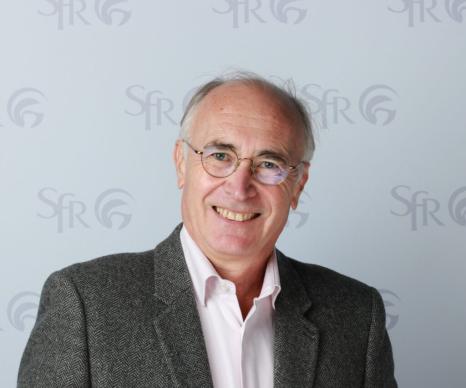
Xavier Mariette: the quest for treatments to cure autoimmune diseases
Xavier Mariette is head of the Immuno-Rheumatology Department at Bicêtre Hospital, professor of rheumatology at Université Paris-Saclay and director of the Autoimmunity team in the Immunology of Viral, Autoimmune, Haematological and Bacterial Diseases Laboratory (IMVA-HB - Univ. Paris-Saclay/French National Institute of Health and Medical Research, Inserm/French Alternative Energies and Atomic Energy Commission,CEA). He has dedicated his career to studying autoimmune diseases and developing new treatments.
Xavier Mariette began his medical studies in 1977 at Paris Descartes University, where he discovered immunology. After completing his internship in 1987, he developed a passion for rheumatology, drawn by the clinical examination of patients and the significant role of immunological mechanisms in immuno-rheumatological diseases. "Autoimmune diseases, where the immune system turns against the body, affect nearly 10% of the world's population and represent a major public health challenge." From 1987 to 1989, he continued his training in the rheumatology clinic at Bicêtre Hospital. In order to further his knowledge of immunology, he joined Saint-Louis Hospital, where he completed a DEA (equivalent to a 2nd year Master’s degree today) and then a PhD. He specialised in studying B lymphocytes and autoantibodies - proteins secreted by inflammatory cells that attack the body's components, leading to various pathologies. For ten years, he worked at Saint-Louis Hospital as a university hospital practitioner, then as a lecturer in immunology.
Understanding autoimmune diseases
In 1999, Xavier Mariette returned to rheumatology, a field transformed by the introduction of immunotherapies and anti-TNF (Tumour Necrosis Factor) treatments, which revolutionised the management of rheumatoid arthritis and other inflammatory rheumatic diseases. He subsequently joined Université Paris-Saclay (then Université Paris-Sud) as a professor and head of department at Bicêtre Hospital.
His initial research focused on a newly discovered cytokine, BAFF (B-cell Activating Factor of the TNF Family). This protein, secreted by immune system cells, plays a crucial role in the activation of autoimmune B lymphocytes, involved in a wide variety of autoimmune diseases. "In my field, rheumatoid arthritis is the most common. But in neurology, there's multiple sclerosis, in gastroenterology, Crohn's disease and in endocrinology, type 1 diabetes in children." Professor Mariette focused on the rare Sjögren's syndrome, which was characterised by dry eyes and mouth due to lymphocyte infiltration around the secretory glands, joint pain, complications in many organs and an increased risk of a lymph node cancer called lymphoma.
Upon his arrival, Xavier Mariette initiated the development of a clinical research sector within his department, where he introduced the use of biotherapies for inflammatory rheumatism and autoimmune diseases. At the same time, he expanded the translational research activities of the Immune Response Regulation, HIV and Autoimmunity laboratory. In 2003, with his team, he was the first to demonstrate the role of the BAFF cytokine in the development of Sjögren's syndrome. "This marked a decisive turning point in our approach to autoimmune diseases, paving the way for new targeted therapies." Indeed, Belimumab, an anti-BAFF antibody used for the past ten years to treat lupus - an autoimmune disease characterised by joint, skin and kidney symptoms - and Ianalumab, an anti-BARR receptor antibody currently in development, are now used in the treatment of lupus and Sjögren's syndrome.
In 2015, Xavier Mariette's research team, dedicated to autoimmune diseases, gained independence and moved to the Centre for Research in Immunology of Viral, Autoimmune, Haematological and Bacterial Diseases (IMVA-HB - Univ. Paris-Saclay/Inserm/CEA). That year, it was awarded the Foundation for Medical Research (Fondation pour la Recherche Médicale, FRM) label, which was renewed in 2023.
CARE: exploring the link between autoimmune diseases and cancer
Another research focus for Xavier Mariette relates to the close links between autoimmune diseases and cancer. Sjögren's syndrome, for instance, carries an increased risk of lymphoma and anti-inflammatory immunotherapies have the potential to increase cancer risk. Conversely, immunotherapy treatments carry a significant risk of autoimmune diseases. To explore this bidirectional relationship, Professor Mariette established the Cancer and Autoimmunity Relationships (CARE) hospital-university federation in 2019. CARE brings together clinicians and researchers specialising in autoimmune diseases and oncology and promotes the understanding of the mechanisms connecting these two fields. Building on this success, a Major Research Area (‘Domaine d'Intérêt Majeur’, DIM) was created in 2022 with the support of the Île-de-France region, funding calls for projects dedicated to this theme.
Hope for a cure with CAR-T cells
Today, Xavier Mariette continues his research with the aim of developing new therapeutic strategies. In particular, he is exploring the use of CAR-T cells or bispecific antibodies, initially used in refractory haematological malignancies. Investigating their potential to eradicate B lymphocytes responsible for autoimmune diseases opens up new therapeutic possibilities. "I dream of managing to develop treatments capable of permanently eradicating the cells responsible for autoimmune diseases, in order to achieve a cure." This would offer patients lasting remission without dependence on medications with potential side effects, as is the case today.
Xavier Mariette frequently uses samples from patients for all his research. "By combining clinical research, therapeutic trials and translational laboratory research, we improve the quality and life expectancy of these individuals."
Teaching and chairing the Scientific Advisory Board
Alongside his research activities, Xavier Mariette is involved in teaching and educating young researchers in rheumatology and immunology. For the past decade, he has also chaired the Scientific Advisory Board of the Faculty of Medicine at Université Paris-Saclay. His role involves facilitating the integration of university hospital staff into research teams, encouraging the arrival of new teams and stimulating interaction between the 24 research units of the University's Faculty of Medicine and other disciplines.
Prestigious awards
The excellence of Xavier Mariette's research has earned him countless awards. In 2017, he received the Guillaumat-Piel prize from the Foundation for Medical Research, which honours researchers in the field of osteoarticular diseases and blood disorders. In 2023, he was one of the Highly Cited Researchers named by Clarivate Analytics, which ranks him among the top 1% of the most cited scientists in medicine. "I'm proud of this distinction, as it's quite rare and testifies to the recognition of my work by my peers." These individual accolades are accompanied by collective recognition; his team was awarded by the Foundation for Medical Research in 2015 and again in 2023, highlighting the excellence of their work.

